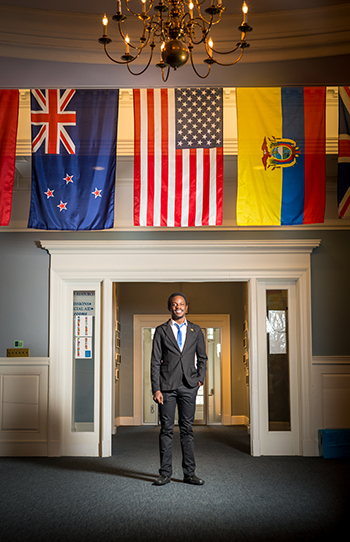
A Link Between the World and Those Who Suffer: Bernard Botchway's Path to the International Stage
In August 2013 Bernard Botchway '15 of Ghana received a Resolution Project Fellowship at the Youth Assembly at the United Nations (U.N.) in New York City. The fellowship is presented to undergraduate social entrepreneurs for outstanding dedication to sustainable impact, innovation, teamwork, and a commitment to making a positive change and helping others. It provides seed money to launch the proposed resolution, mentorship, and access to a network of similarly minded change makers.
Botchway's proposed resolution focused on the integration of technology into the African classroom. It is built on the belief that if technological education begins at an early age, it will engender a generation of students ready to compete in the international job market and create opportunities—not just fill vacancies.
An Optimistic Faith in Action
Botchway has every reason to be a cynic. He is part of a generation of young Africans looking to build in the 21st century a future that moves beyond the broken promises of the 20th.
In 1957 Ghana became the first African state to achieve independence from a colonial power. Kwameh Nkrumah, the first democratically elected leader of independent Ghana, promised to turn his country into a leader of a pan-African revolution that would unify and develop the continent. His vision never materialized. Promises of democracy gave way to a one-party state and an eventual CIA-backed coup that removed Nkrumah from office. Plans for development faded in light of the realities of an international economic system that pushed Ghana to the economic periphery.
Despite these reasons for cynicism and disengagement, Botchway developed a passion for politics built around an optimistic faith in the transformative power of collective action. Botchway's belief in the power of politics and interest in the U.N. emerged at a young age. “When you grow up in a country like Ghana, you tend to see the effects of an organization like the United Nations, especially when the people that come to immunize you are from UNICEF, or UNDP, or UNESCO,” said Botchway.
Botchway's mother was a nurse, and a shortage of nurses in the United Kingdom led to his family moving there when he was only six. Instead of his interest diminishing in the U.N., it grew as he traveled and began to experience the world. “In a place like Darfur, where a square meal a day is something you dream about, and you see that person in the blue vest approaching with one bag of yellow corn or a bag of millet to keep you alive, that is when you see the value of the contribution made by the U.N.,” said Botchway.
For Botchway, the U.N. is important not just for the services it provides but also for what it represents. Unlike the failed ideologies of the 20th century, which offered grand visions of the future but delivered little, the U.N. offers not another promise but a possibility. This possibility, hiding in plain sight, is revealed by the rather banal layout of the U.N. building in New York. “Conference rooms are everywhere,” Botchway said. “It is a place of energy, with different languages being spoken and delegates running from one subcommittee to the next.” The building is meant to facilitate networking and the sharing of ideas. The possibility of the U.N. is that conflict can be resolved in a conference room instead of on a battlefield, that compromise can achieve more than conflict, and that political power can emerge from people sharing ideas and acting in concert.
Above all, the U.N. is relevant because of what it makes possible for the world's powerless. “We would like to believe that there is equality in every part of the world, but that is simply not the case,” said Botchway. “We recognize that people should be brought up to certain minimum levels, but this demands a united, constructive effort. The United Nations is the platform upon which this work can take place. Such an institution playing this role gives people hope, and sometimes hope is key; it is the belief that someone is watching our back and that there is a link between the world and those who are suffering.”
While at Colby-Sawyer, Botchway has served as a link between the Colby-Sawyer community and the U.N. He serves as the Greater New London Area coordinator for the UNICEF Campus Initiatives movement and recently joined the U.N.'s International Youth Council.
After leaving Colby-Sawyer, Botchway plans to study international law before working for the U.N. He recognizes that by serving the U.N., he will also serve the people of Ghana. Botchway's ultimate dream is to return to Ghana as an elected official.
It is clear to anyone who meets Botchway that he personifies the Colby-Sawyer mission of linking to the world. Like the U.N., Botchway is a force focused on forging connections between people, places and ideas.
-Eric Boyer, Associate Professor, Social Sciences and Education


